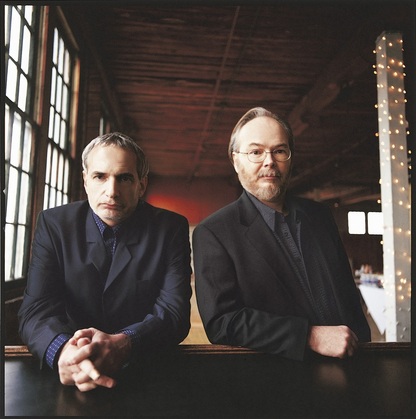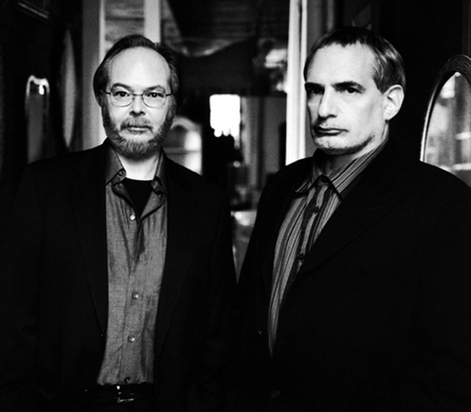Steely Dan: Unconventional Wisdoms
Published in Berkshire Eagle, 7/22/11

Photo: Danny Clinch
By Jeremy D. Goodwin
LENOX—Steely Dan has never had much use for rock and roll, or its conventions.
The group of jazz-pop auteurs—who play Tanglewood on Tuesday—in many ways seem to have little to do with their peers in the greater rock realm. Steely Dan is not a band of brothers who built a fanbase through touring; for most of their history they never played live, and they’re not really even necessarily a band, as most people understand the term. More precisely, it’s two songwriters who hired a rotating cast of studio musicians to execute their work. Steely Dan is in the Rock and Roll Hall of Fame and achieved great commercial success, but its two principle members —Donald Fagen and Walter Becker— remain fairly anonymous to the casual fan. And they have a stunningly extensive litany of radio hits ("Reeling in the Years," "Rikki Don't Lose That Number," "Hey 19," "Peg," "My Old School," "FM," and on and on), yet the person on the street may claim to not know their work…until he hears a song and says, "Oh yeah, those guys?"
Through a body of work strung from 1972 to 1980, augmented by an unlikely comeback in the mid-90’s, Steely Dan pushed the boundaries for smart pop that relished (some may say wallowed in) pristine studio polish. For most of their career, Becker and Fagen's practice was to hire the most accomplished session men in the business—and sometimes even great jazz artists with legacies in their own right, like sax legend Wayne Shorter—to pull off their sophisticated arrangements, while enveloping it all in a radio-friendly gloss that never feels cloying.
For the music snob who is prone to sneer at the likes of the Top 40, Steely Dan is the ultimate (not so) guilty pleasure.
Steely Dan became a band almost by accident. Becker and Fagen, inspired by the soon-to-vanish world of the Brill Building and its legendary songwriters, were hired as house writers at a record label but ended up assembling a band to give voice to their compositions. Vocal duties were shared on their debut album “Can’t Buy A Thrill,” but Fagen sang on the two songs that became hits, so he became the vocalist. By the group’s third album, Becker and Fagen turned the group into a studio-only enterprise, remaining the only constant elements. This made it all the more surprising when the two re-united 13 years after their last album for big tours in 1993 and 1995. The partnership resumed with the album “Two Against Nature” in 2000; this could have easily been a moneymaking but legacy-diluting move, but the album improbably maintained the group’s high standards and even won the Grammy for Album of the Year.
The Dan is now touring with a 13-member band (including four horn players and three backing singers), happily revisiting the hits, sometimes playing entire albums, and encouraging fans to request songs online.
Then there are the lyrics, typically penned by Fagen and sung with the vocal equivalent of a scowl. They are frequently so dry, so cynical, so dense with in-jokes and references that hint at worlds of meaning while remaining curtly mysterious, that even hipsters can find this radio-ready mainstream behemoth to be irresistible.
LENOX—Steely Dan has never had much use for rock and roll, or its conventions.
The group of jazz-pop auteurs—who play Tanglewood on Tuesday—in many ways seem to have little to do with their peers in the greater rock realm. Steely Dan is not a band of brothers who built a fanbase through touring; for most of their history they never played live, and they’re not really even necessarily a band, as most people understand the term. More precisely, it’s two songwriters who hired a rotating cast of studio musicians to execute their work. Steely Dan is in the Rock and Roll Hall of Fame and achieved great commercial success, but its two principle members —Donald Fagen and Walter Becker— remain fairly anonymous to the casual fan. And they have a stunningly extensive litany of radio hits ("Reeling in the Years," "Rikki Don't Lose That Number," "Hey 19," "Peg," "My Old School," "FM," and on and on), yet the person on the street may claim to not know their work…until he hears a song and says, "Oh yeah, those guys?"
Through a body of work strung from 1972 to 1980, augmented by an unlikely comeback in the mid-90’s, Steely Dan pushed the boundaries for smart pop that relished (some may say wallowed in) pristine studio polish. For most of their career, Becker and Fagen's practice was to hire the most accomplished session men in the business—and sometimes even great jazz artists with legacies in their own right, like sax legend Wayne Shorter—to pull off their sophisticated arrangements, while enveloping it all in a radio-friendly gloss that never feels cloying.
For the music snob who is prone to sneer at the likes of the Top 40, Steely Dan is the ultimate (not so) guilty pleasure.
Steely Dan became a band almost by accident. Becker and Fagen, inspired by the soon-to-vanish world of the Brill Building and its legendary songwriters, were hired as house writers at a record label but ended up assembling a band to give voice to their compositions. Vocal duties were shared on their debut album “Can’t Buy A Thrill,” but Fagen sang on the two songs that became hits, so he became the vocalist. By the group’s third album, Becker and Fagen turned the group into a studio-only enterprise, remaining the only constant elements. This made it all the more surprising when the two re-united 13 years after their last album for big tours in 1993 and 1995. The partnership resumed with the album “Two Against Nature” in 2000; this could have easily been a moneymaking but legacy-diluting move, but the album improbably maintained the group’s high standards and even won the Grammy for Album of the Year.
The Dan is now touring with a 13-member band (including four horn players and three backing singers), happily revisiting the hits, sometimes playing entire albums, and encouraging fans to request songs online.
Then there are the lyrics, typically penned by Fagen and sung with the vocal equivalent of a scowl. They are frequently so dry, so cynical, so dense with in-jokes and references that hint at worlds of meaning while remaining curtly mysterious, that even hipsters can find this radio-ready mainstream behemoth to be irresistible.

In detail-rich lines dense with cultural signifiers—Dean and Deluca and Gramercy Park, a car phone in a Chrysler (in 1980), Cuervo Gold and "fine Columbian"—Fagen depicts a world of cocktail lounges and late-night ice cream parlors, romantic conquests that lead to malaise and romantic failures that inspire pride, white men possessing disposable income and a good dose of nihilism.
Witness the opening lines to "Glamour Profession," describing a drug deal about to go down: "6:05 outside the stadium/ Special delivery for Hoops McCann/ Brut and charisma poured from the shadow where he stood/ Looking good, he's a crowd pleasing man."
In fact, the depictions of characters or settings can be so vividly drawn (yet teasingly ambiguous) as to seem satirical. Any major Dan fan likely has a short-list of lyrics that make him or her burst out laughing, though it can be hard to explain just what is so funny. For me, perhaps inexplicably, it's the reference to "Szechuan dumplings" in “Glamour Profession.” Or this noir-ish couplet from "Deacon Blues," off the smash album "Aja" from 1977:
"I crawl like a viper through these suburban streets
Make love to these women, languid and bittersweet."
Sometimes the lyrics are so finely calibrated, a single changed word or phrase implies devastating impact. See the switch, in the final chorus, from "baby it's you" to "possibly you" in "Janie Runaway" or the change from "and your elevator shoes" to "and the studs that match your eyes" in the chorus of "Gaucho." A giddy love song transforms to an implied threat; a hipster's lament becomes disguised heartbreak.
Steely Dan presents an excellent excuse to enjoy clean, jazzy pop music. In the end, the pleasure isn’t really so guilty after all.
Witness the opening lines to "Glamour Profession," describing a drug deal about to go down: "6:05 outside the stadium/ Special delivery for Hoops McCann/ Brut and charisma poured from the shadow where he stood/ Looking good, he's a crowd pleasing man."
In fact, the depictions of characters or settings can be so vividly drawn (yet teasingly ambiguous) as to seem satirical. Any major Dan fan likely has a short-list of lyrics that make him or her burst out laughing, though it can be hard to explain just what is so funny. For me, perhaps inexplicably, it's the reference to "Szechuan dumplings" in “Glamour Profession.” Or this noir-ish couplet from "Deacon Blues," off the smash album "Aja" from 1977:
"I crawl like a viper through these suburban streets
Make love to these women, languid and bittersweet."
Sometimes the lyrics are so finely calibrated, a single changed word or phrase implies devastating impact. See the switch, in the final chorus, from "baby it's you" to "possibly you" in "Janie Runaway" or the change from "and your elevator shoes" to "and the studs that match your eyes" in the chorus of "Gaucho." A giddy love song transforms to an implied threat; a hipster's lament becomes disguised heartbreak.
Steely Dan presents an excellent excuse to enjoy clean, jazzy pop music. In the end, the pleasure isn’t really so guilty after all.
